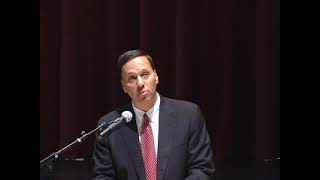President offers update on finances, and a look ahead
MIDDLEBURY, Vt.—Just after noon on September 22 in a packed McCullough Social Space, President Ronald D. Liebowitz offered a mostly upbeat update on Middlebury’s financial health and talked about the college’s plans for the coming year and beyond.
The president, following up on his Mead Chapel address on finances in February, highlighted the financial successes of the last year, which included a budget surplus for the fiscal year that ended June 30; a projection of balanced budgets for the next five years, based on more realistic fundraising and revenue projections to reflect the uncertain economy; and a return on the endowment of close to 18 percent. He noted that the endowment has rebounded to $815 million from its low of $649 million in the depth of the Great Recession, though it remains far from its pre-recession high of $962 million.
President Liebowitz said that increased revenues, thanks to record annual fund totals and an increase of 50 students to the budgeted enrollment, combined with disciplined spending had allowed Middlebury to preserve “the institution’s top four priorities: first, we avoided staff layoffs; second, we protected the academic program—we maintained our student-faculty ratio of 9-1 and continued to hire faculty into open positions from an incredibly talented pool of applicants; third, we retained our need-blind admissions policy for U.S. students; and fourth, we preserved the college’s excellent benefits package for faculty and staff.”
While his overall message was positive, including recognition of and thanks to many who have made sacrifices over the past year in departments and offices across the college, the president acknowledged that changes so far have not been without stress—and that more adjustments are still to come. He called for ongoing fiscal discipline, especially as the Staff Resources Committee (SRC), led by Vice President for Administration Tim Spears, continues its assessment of the allocation and re-allocation of staff resources. In addition to its work on attempting to ensure adequate staffing for all offices and departments, the SRC will continue its examination of the current salary structure, and, now that the salary freeze for those making more than $50,000 has been lifted, look at developing a more equitable process for future raises.
Watch the Video
“As the SRC’s important work goes on,” the president said, “I want to underscore the need for improved internal communications surrounding staffing and other issues. Based on what I learned in meetings with Staff Council and other groups this past month, it is clear that providing just a brief explanation for decisions taken by the senior administration would go a long way to building more trust and confidence among the staff in general, and among those asked to implement those decisions in particular. I pledge to make this a priority of mine this coming year—working with my senior staff to ensure that we give adequate explanations for our decisions, and that these explanations are communicated throughout the organization. I can’t guarantee that everyone will agree with all of our decisions, but I am determined to make sure that decisions are at least understood.”
He encouraged members of the college community to “ask questions when you don’t understand something, rather than just wonder or think the worst. I am proud of how transparent we have become in sharing and discussing financial information. … I believe that increasing the financial literacy of our students, faculty, and staff can only make us a stronger institution, more likely to work together effectively to solve the kinds of challenges we have been facing the past two years, and allow us to focus our attention on some interesting and more pressing issues for the coming year.”
Saying that “we can’t quite declare victory and ignore completely the economy and its impact on what we do and how we do it,” the president said he is “determined to refocus the college’s agenda toward what we care about most and do best: the education of our students.”
Among the many issues that will be on the front burner this year: a discussion, jump-started at the Bread Loaf faculty meeting this month, of the curriculum of the future and how faculty see themselves and their disciplines within that future; institutional diversity, broadly defined, aided by the return of Shirley Collado as dean of the college and chief diversity officer; curricular discussions, including the addition of global health and linguistics as areas of study; college policies on compensation for faculty and staff; and what’s called “institutional self-study,” a pre-cursor to Middlebury’s pursuit of reaccreditation by the New England Association of Schools and Colleges.
The president closed by thanking the entire college community, and recommending that we “get beyond what has changed, what has been lost, and notice the remarkable progress the college has made. Though there is much to be done this year to align expectations, workloads, and mission, I ask that you step back from all the stress, the added work you have taken on, and whatever ill feelings you might harbor over what we—or what I—could have done differently, to recognize what has been a remarkable team effort.
“As always, I look forward to working with all of you as we re-engage our mission with a renewed sense of accomplishment. I hope each and every one of you will join me with the same spirit you have exhibited during these tough times—a spirit that is the very fabric of our institution—and help take this college to a level of excellence and pride it has yet to experience.”

